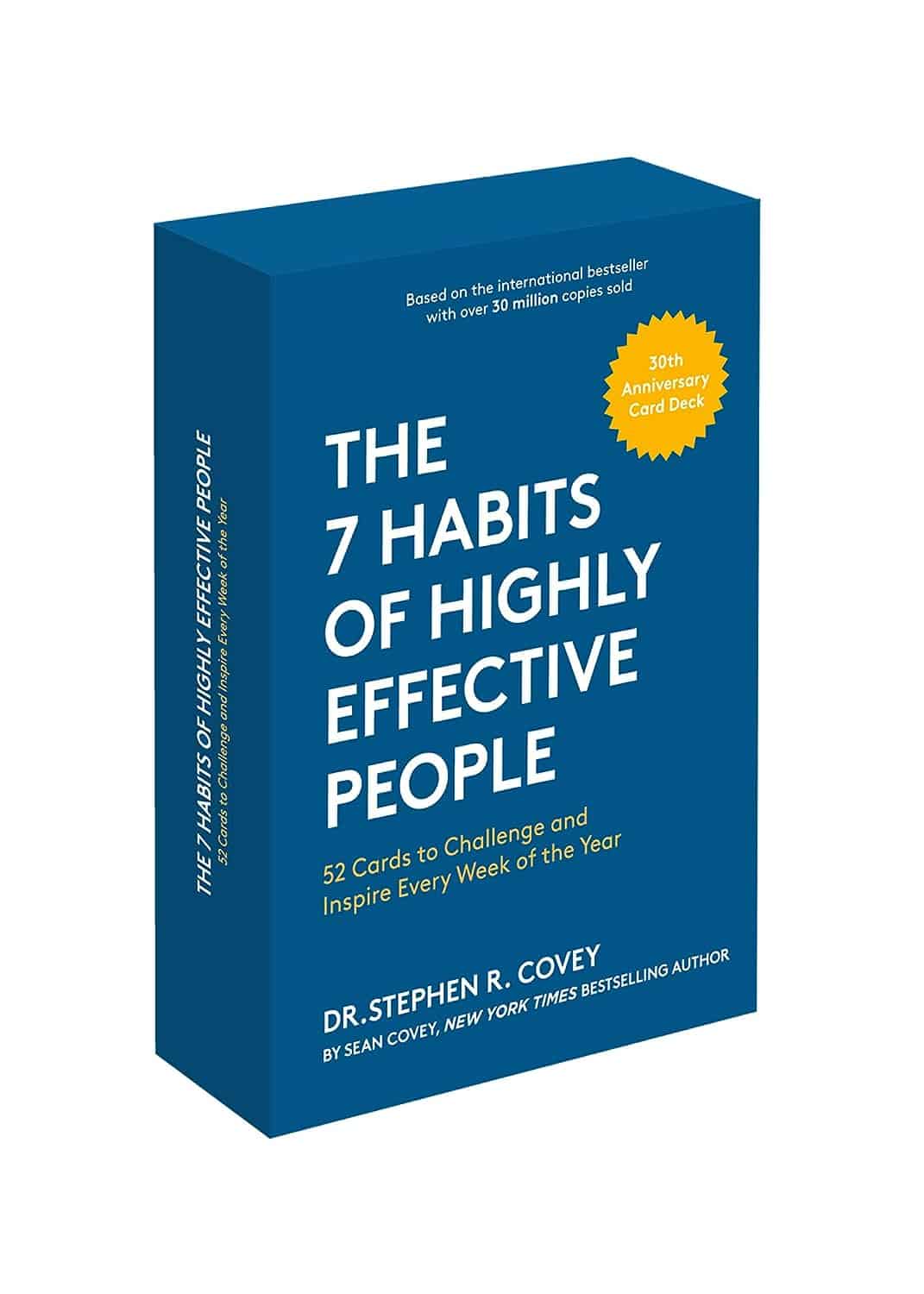
Introduction to the 7 Habits
Stephen Covey’s masterpiece, The 7 Habits of Highly Effective People, has shattered personal development and professional life ceilings. This book reveals what it means to excel in today’s dynamic world. Covey introduced a pattern shift crucial for anyone striving to improve their personal and professional effectiveness. It’s not just another self-help book; it’s a guide towards achieving a principle-centered approach to personal and professional growth. Covey’s work transcends quick fixes, urging us to focus on character ethics rather than personality ethics. This involves a deeper understanding of our core values and principles as the foundation of success. Through Covey’s lens, we are encouraged to move from dependence to independence and, ultimately, interdependence. His holistic approach combines personal mission statements, empathetic communication, and a win-win mindset into a coherent framework for living a fulfilled and productive life.
The Foundation: Private Victory
At the core of one’s journey towards becoming highly effective, both personally and professionally, lies the concept of a private victory. This foundational phase is the foundation upon which personal mission statements are built. It is a deep dive into self-awareness, urging you to shift patterns and embrace proactive means over being reactive. You start by laying out clear guiding principles and core values, defining your circle of influence versus your circle of concern.
Stephen Covey teaches us that to cultivate a win-win mindset and foster mutual benefit in our interactions, one must first achieve mastery over oneself. The private victory pushes you to prioritize the most critical things, allowing you to navigate external factors with a principle-centered approach. This is not a quick fix but a solid foundation for building character ethics, upon which public victory and interdependent relationships are subsequently developed.
Habit 1: Be Proactive
Stephen Covey introduced us to the principle of being proactive, a foundation for personal empowerment. Recognizing the difference between proactive and reactive people, he showed how adopting a proactive stance leads to a pattern shift. Proactive individuals do not let external factors dictate their decisions; instead, they focus on their circle of influence, navigating through life’s challenges with a principle-centered approach.
They embrace responsibility for their choices and reactions. This critical habit lays the foundation upon which personal mission statements are built, guiding toward a life of mutual benefit. It emphasizes character ethic over personality ethic, advocating for a shift from reactive to proactive language. Doing so propels individuals from the circle of concern into a realm of positive change, steering personal lives away from quick fixes toward a path of enduring principles. This shift impacts one’s personal life and radiates into professional effectiveness, making it a cornerstone for all subsequent growth.
Habit 2: Begin with the End in Mind
In his self-help books, Stephen Covey introduced a powerful concept, urging us to envision our mission statements. This idea forms the crux of being proactive people. Imagine you’ve reached the end of your journey. What did you accomplish? Who were the important people around you? Reflecting on these end goals does more than sketch a clear vision. It lays out a roadmap, steering us away from the distraction of less essential activities that reactive people often get caught up in.
By understanding your circle of influence, you chart a course that aligns with your core values. This isn’t a quick fix but a paradigm shift. It demands a transition from a personality ethic, which focuses on the public image and external factors, to a character ethic rooted in principle-centered living. It’s about crafting a life that reflects what’s truly significant, building relationships, and fostering personal growth.
Habit 3: Put First Things First
Stephen R. Covey emphasized an essential truth in “The 7 Habits of Highly Effective People”: the distinction between urgent and crucial tasks. This revelation is the bedrock for Habit 3: Put First Things First. Covey proposed managing our time by focusing on the most essential things in life, which significantly shifts our daily life towards effectiveness.
Character ethics become visible as we prioritize actions based on a solid foundation, core values, and guiding principles. Covey’s time management matrix introduces us to categorize tasks by urgency and importance, allowing a clear vision for our personal and professional lives. This method fosters a proactive means of living, distancing us from being reactive to external factors. Integrating this habit establishes a principle-centered approach to personal growth, laying a foundation for achieving a private victory.
Achieving Public Victory
After laying a solid foundation through mastering oneself, the journey evolves. It transitions toward public victory, directing efforts outward to form and nurture relationships with others. This shift is crucial. It captures the essence of moving from personal victory to achieving goals that hinge on interpersonal effectiveness. Mastering relationships is not a solitary endeavor. It demands an understanding that we are part of a much larger circle.
Public victory unfolds through practices like the win-win mindset, empathetic listening, and synergizing. These habits guide us to seek mutual benefit, understand before seeking to be understood, and value the contributions of others. This transition is delicate, requiring a proactive stance toward life and people. By honing these skills, you can cultivate meaningful, effective, and transformative relationships.
Habit 4: Think Win-Win
Stephen R. Covey introduced a paradigm shift with a win-win mindset, a core value in fostering mutual benefit in any interaction. This approach hinges on the belief that another doesn’t need to fail for one to succeed. It’s a decisive departure from the scarcity mentality, which views success as a zero-sum game. By prioritizing a win-win solution, individuals and teams unlock innovative solutions that benefit all parties involved.
Adopting this mindset requires a conscious effort to shift away from traditional competitive tactics or quick fixes that prioritize personal gain at the expense of others. Instead, it calls for deep introspection into one’s core principles and a commitment to positive change that respects human dignity and interpersonal effectiveness. Success, in the long run, relies on building relationships based on trust and respect, where each member’s contribution is valued, and mutual benefit is the ultimate goal. A win-win approach enhances professional life and enriches personal lives, paving the way for lasting principle-centered success.
Habit 5: Seek First to Understand, Then to Be Understood
Deep introspection teaches us the immense value of empathetic listening and clear communication. You shall discover that nurturing solid interpersonal relationships hinges on our capacity to genuinely understand others before seeking to be understood ourselves. This profound lesson, drawn from Stephen Covey’s influential work on practical personal and professional living, shifts a paradigm, urging a move away from reactive responses towards proactive engagement with the perspectives and needs of those around us.
A mutual benefit blossoms in the soil of such understanding, laying a solid foundation for public victory in any sphere of life. It’s not merely about hearing the words of another but tuning into the unspoken emotions and thoughts they convey. This exercise in human dignity facilitates not just the resolution of conflicts but fosters innovative solutions, transforming interactions from simple exchanges to deeply enriching experiences. Building relationships on this principle of mutual respect and understanding affirms the character ethic Covey espoused, guiding us towards a principle-centred approach in all our dealings.
Habit 6: Synergise
This habit underscores the power of teamwork, harnessing diverse talents and perspectives. Through synergizing, you embrace the principle that innovative solutions often originate from the fertile ground of collaborative efforts. This approach values differences, inviting a creative process that transforms individual contributions into outcomes far exceeding the sum of their parts. Synergy moves us beyond cooperation, fostering an environment where the whole becomes exponentially more impactful.
Acknowledging that team members bring distinct strengths and viewpoints to the table engenders a climate of mutual respect and understanding. This mindset paves the way for exploring innovative solutions. When we synergize, we consciously make an effort to leverage these differences. This, in turn, enables us to craft solutions embodying the essence of deep introspection and holistic thinking. The result? A vibrant combination of ideas woven together to achieve goals unreachable by anyone alone.

Continuous Growth: Renewal and the Seventh Habit
Continuous improvement and self-renewal are at the heart of lasting success. These concepts, encapsulated in the seventh habit, emphasize the importance of maintaining a holistic approach to personal development. This habit, often termed sharpening the saw, advocates for regular renewal in four critical dimensions: physical, social/emotional, mental, and spiritual.
Maintaining physical health demands regular exercise, proper nutrition, and sufficient rest. It forms the solid foundation upon which your emotional stability and sharp intellect can build. In social and emotional well-being, fostering solid relationships and investing in positive interactions refills your reservoir of positive energy. Mental renewal involves continuous learning and intellectual growth, opening your mind to innovative solutions and perspectives. Lastly, to renew spiritually, you should engage in activities that connect you with your inner values and provide a sense of peace and purpose.
Embarking on this journey of self-renewal propels you towards holistic well-being. It ensures that each facet of your life receives the attention and care it deserves, paving the way for unparalleled personal and professional effectiveness.
Habit 7: Sharpen the Saw
In his landmark book, Stephen R. Covey introduced the seventh habit, “Sharpen the Saw,” as a metaphor for self-renewal. This habit emphasizes the importance of maintaining a balanced, principle-centered approach to the four dimensions of our lives: physical, social/emotional, mental, and spiritual. Maintaining a holistic approach ensures a foundation for practical living and fosters long-term success.
For our physical health, proactive people engage in regular physical activity, understand the value of nutrition, and prioritize rest. This dimension supports our well-being and empowers us to tackle life’s challenges. Socially and emotionally, cultivating good relationships and investing in social interactions entail empathetic listening and communicating effectively. This nurtures our emotional health and contributes to our interpersonal effectiveness.
In the mental realm, continuous learning, reading, and engaging with new ideas foster growth and innovation. They sharpen our creative process and keep us moving in the right direction. Spiritual renewal might involve meditation, deep introspection, or connecting with our core values. They revitalize our inner compass and guide us to do the right thing. Together, these practices create a solid foundation for personal growth and a life characterized by continual improvement.
Implementing the 7 Habits into Your Life
Mastering Stephen Covey’s The 7 Habits of Highly Effective People demands mindful dedication. Incorporating these habits into your life transforms the abstract into tangible results. Begin with Habit 1: Be Proactive. Consciously opt for proactive language over-reactive language. This minor shift steers you towards a life where your circle of influence expands. Focus next on envisioning your ultimate goals. Crafting a personal mission statement empowers you to Begin with the End in Mind. This clarity paves the way for setting priorities that resonate with your core values.
Advancing to the third habit, Put First Things First, you’ll start to identify the most important tasks each day. These aren’t always the urgent ones. Distinguish between the two to ensure your energy aligns with personal growth and professional effectiveness. As you naturally progress, the essence of mutual benefit in Think Win-Win becomes apparent, fostering healthier interpersonal relationships. Seeking First to Understand and then to Be Understood cultivates rich, empathetic interactions that pave the way for innovation when you Synergise.
Last but not least, the Seventh Habit anchors this transformative journey. Sharpen the Saw by dedicating time to personal and professional renewal. This holistic approach ensures sustained effectiveness, nurturing your physical, emotional, mental, and spiritual dimensions. Embark on this path with patience and persistence, as embodying the 7 Habits enriches yourself and those around you.
Transforming Principles into Practice
Moving from knowing about Stephen Covey’s enlightening principles to actively living them demands deep introspection and unwavering commitment. You have learned the intricate dance between personal and professional effectiveness, getting acquainted with habits that transform reactive people into proactive architects of their destiny. It’s about the underlying character ethic, leaning heavily on a principle-centered approach.
Engrave the essence of a win-win mindset and the vitality of a proactive language deep within your core values. Acknowledge the power residing in your circle of influence and how it expands when you engage with life proactively. Interpersonal effectiveness, guided by mutual benefit and empathetic communication, paves the way for innovative solutions and builds bridges toward interdependent relationships. Covey’s book wasn’t just a manifesto for the present; it aimed at laying a solid foundation for generations to come, urging a shift from a scarcity mentality to an abundance mentality.
Now, it falls upon you to transform these guiding principles into practice. It asks for more than just understanding—it seeks active engagement. Whether in your personal life or amidst the intricate web of social interactions, embodying these habits means being prepared to say “no” to the wrong direction and “yes” to growth. It’s about making time for essential activities that align with your mission statement, thereby nurturing your mental health and fostering meaningful human interactions. Let this be the first time you commit to a paradigm shift, leading to a life that is effective and deeply fulfilling. Let us embark on this journey, transforming Covey’s visionary habits into our lived experience.
Embarking on a Journey of Effective Living
Adopting Stephen Covey’s The 7 Habits of Highly Effective People offers a transformative journey to empowering change. This principle-centered approach isn’t a quick fix for your personal life or professional effectiveness but a lifelong commitment to growth. By embracing these habits, you position yourself for success in the short run and as a continuous journey toward your fullest potential.
Every habit, from being proactive to synergizing with team members, lays a solid foundation for your mission statement. It teaches you to focus on essential things, fostering mental and emotional health through deep introspection. Recognize that managing your time, seeking mutual benefit in interpersonal relationships, and nurturing your physical health are not just isolated tasks. They are interconnected strategies that propel you toward a balanced and practical life.
Embarking on this journey demands conscious effort. It challenges you to shift your paradigm, replacing bad habits with habits that align with your core values and guiding principles. It calls for letting go of reactive tendencies and adopting a proactive means in every aspect of your daily life. By investing time in essential activities, you cultivate a win-win mindset, aspiring not for immediate gratification but for durable, positive changes in your personal and professional life. Start this journey today, and let each step guide you closer to realizing your dreams, one habit at a time.






